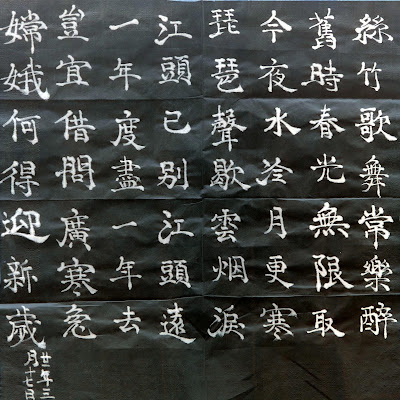My Chinese Poetry Writing Journey
I felt very gratified the other day when someone asked how I learnt to write Chinese poetry. My compositions are paltry and hold no light to my peers. This does not bother me. Poetry writing is a pastime which I enjoy privately and what was written was not meant to be published. I scribbled down the best a youth first in love could muster. The future will come bearing the tools and knowledge to refine it.
Nowadays, it is so much easier with the internet to search for answers. You guys got it easy. However, it is no magic wand and turn you into a great poet overnight. The road towards that mountain top view is arduous and lots of walking and climbing are needed.
1. Record everything you write. If making them public as in a blog or not is your preference. It others can see them, then be prepared to be thick skinned. The records will serve as map of your journey.
2. Read the works of the masters. Copy and pilfer. To me, imitation is sincerest form of flattery. It is like learning to play the piano. You play exactly as written. When the piece becomes a synch, improvisation can be made here and there to suit the particular mood of the time. It may not be good compared to the original but the point is for one to explore and be creative. With enough practice, perfection comes. It may take a long time, but the result is very satisfying.
3. Read from everything else. Inspiration comes from the most unlikely places. It could be listening to a song or doodling on something. Sometimes mine comes from correcting essays of others. Without ideas, even in possession of the most elegant words, they will just remain where they are – locked away in the depths of your mind.

5. It is always difficult in the beginning. As time goes by, things will become easier. So, never get despaired. Put that negative mood to good use and write a sad poem instead of mopping around.
Here is an example. Firefly was written originally in 2010. The first line was inspired by two images in the article of my blog.
螢火不曉鬥星光, The fireflies' light does not know how to vie with the stars,
I did not know how to continue and so I wrote and rewrote the line as a calligraphy practice. Then unconsciously, while listening to a melody, the second line was born.
琴音無意接花香. Flowers' fragrance - zither's unexpected boon.
To the astute, the next two lines were imagery lifted from 杜秋娘’s poem found in the Three
Hundred Poems of the Tang Dynasty,
只識撲奪金鏤衣, To those madly pursuing the glories of the world,
難明春色不待人. Would hardly understand that spring waits for no one.
Her poem is reproduced here for easy reference,
勸君莫惜金鏤衣, I urged my Lord not to covet the golden knitted suit,
勸君惜取少年時. I urged my Lord to cherish the time of youth.
花開堪折直須折, When flowers bloom, they ought to be plucked,
莫待無花空折枝. And wait not no longer in bloom to pluck the empty bough.
My composition has no rhyme and I am sure a thousand rules
on poetry written were broken. At that
time, I didn’t know what those rules were.
Even today, I still have difficulty in deciphering some of them. It was of no consequence to me. I just wrote
them down in my journal. Later as
technology improved, I put it on my blog – just in case there’s a fire...
It languished both physically and digitally for five years
before revisiting it out of the blue on a summer’s day in July, 2015. The biggest change was to the second line to
continue the imagery of the first line and to rhyme it with the last line. The changes are in italics.
微光短短艶紅塵 What a short time for it to glow in this mundane
world,
Then a month later, it was changed to,
微光點點挑花魂, Dimly dotting, arousing souls of flowers.
And two years later in 2017, lines 3 and 4 were slightly
modified to,
郎君只識鏤衣金 My beloved knows only the gold on his
official robes
難解春色不待人.
Would hardly understand that spring waits for no one.
Major
changes were made during another visit in 2018,
螢火不識鬥星光 Light of fireflies knows not how
to vie with starlight
輕舞微點挑花魂 Dotting in
dance, gingerly here and there, arousing souls of flowers
郎君醉傾鏤衣金 My beloved, drunken in the gold
on his official robes
難解春色莫待人.
'tis difficult for him to understand colors of spring wait for no one.
When I revisited the poem when this article was written, there was only one change – to make the first line rhyme with the 2nd and 4th lines.
 螢火不識鬥星辰 Light of fireflies knows not how to vie with starlight
螢火不識鬥星辰 Light of fireflies knows not how to vie with starlight
輕舞微點挑花魂 Dotting in dance, gingerly here and there, arousing souls of flowers
郎君醉傾鏤衣金 My beloved, drunken in the gold on his official robes
難解春色莫待人. 'tis difficult for him to understand colors of spring wait for no one.
By looking at the record of the changes I made, I know that there is improvement at each stage. I don’t care if the final product is good or not. My advice is to keep on going, refining when
felt like it. Compare with no one except with oneself. If today is better than yesterday, then I am on my way to a better mountain top
view even if the journey had taken eleven years. Perhaps, in the future there may be more
changes…
Wednesday, March 3, 2021











